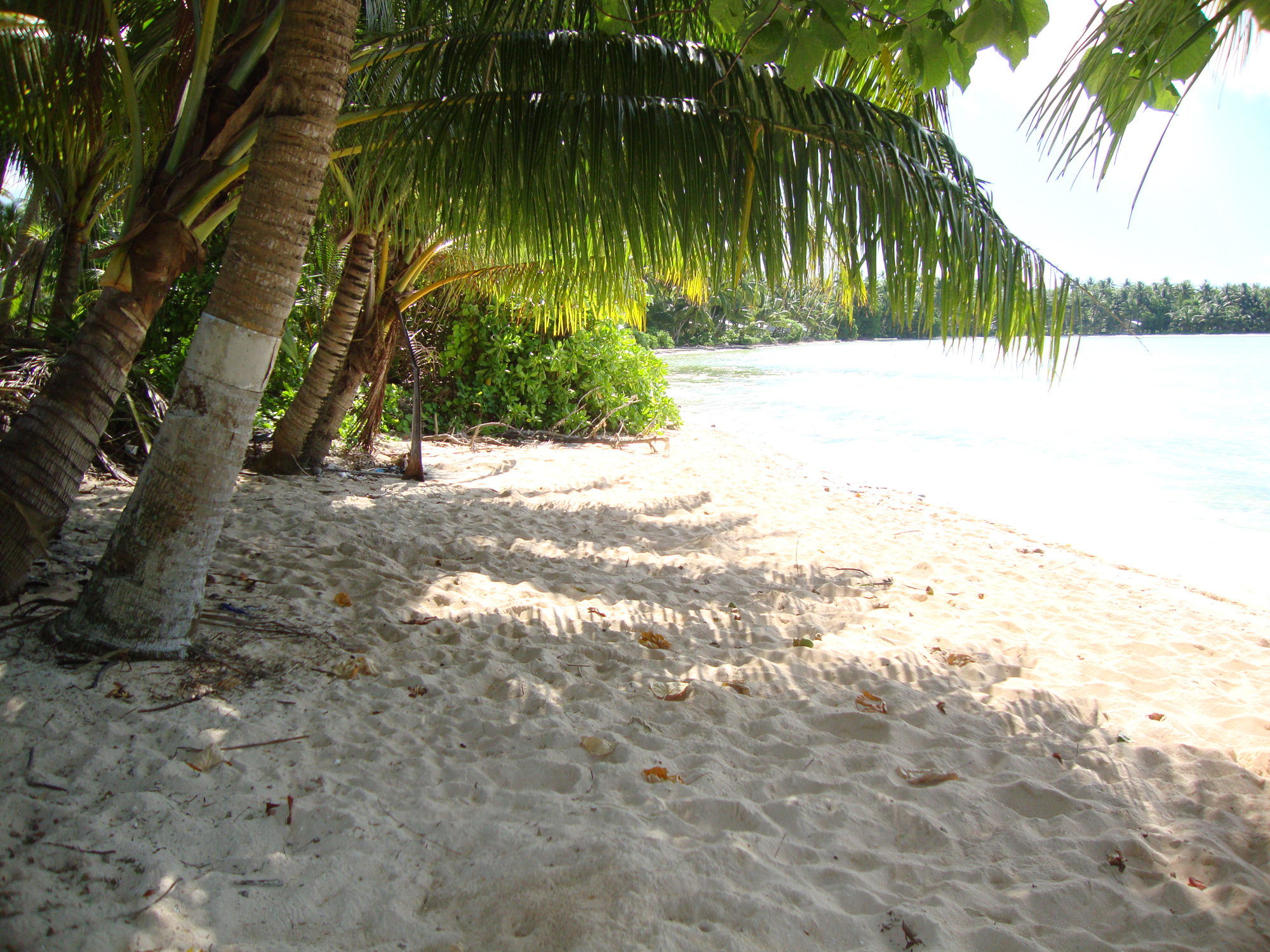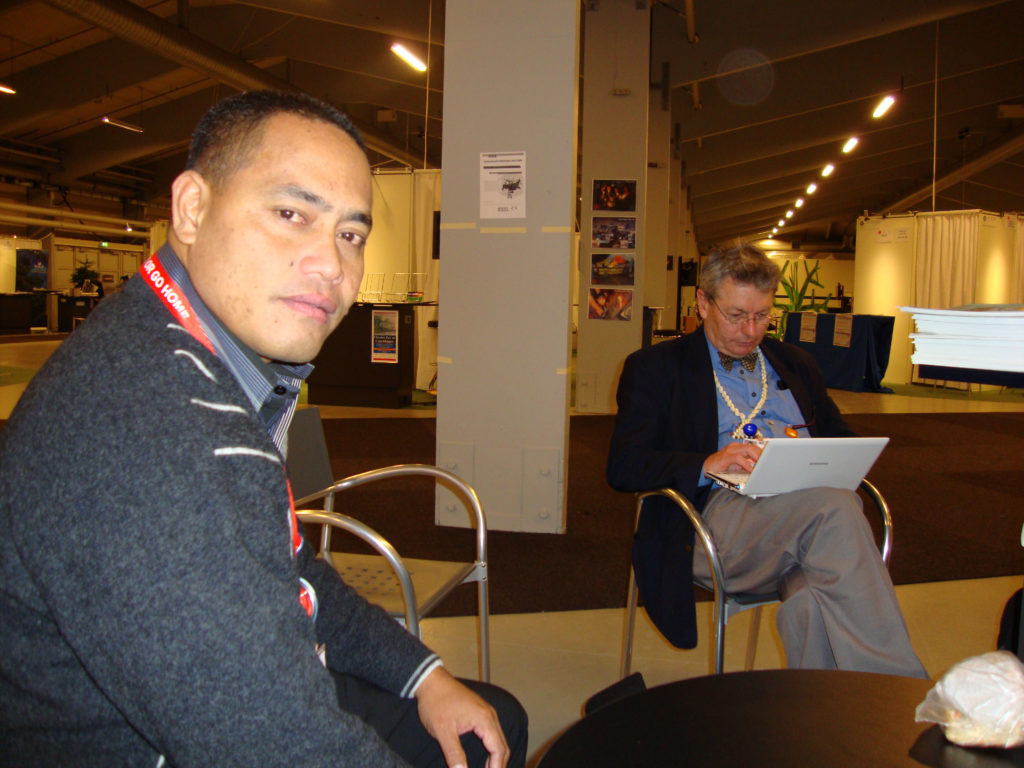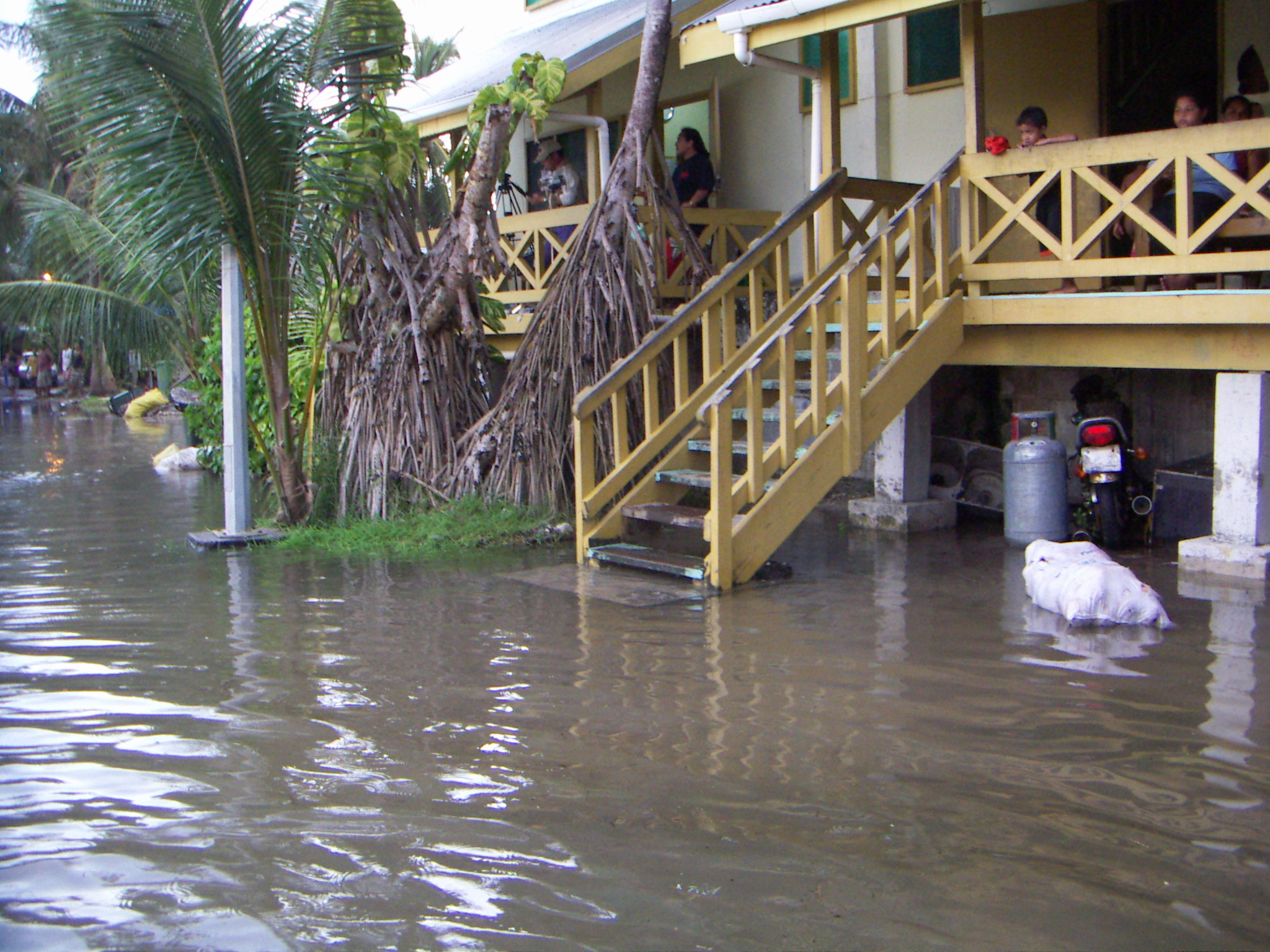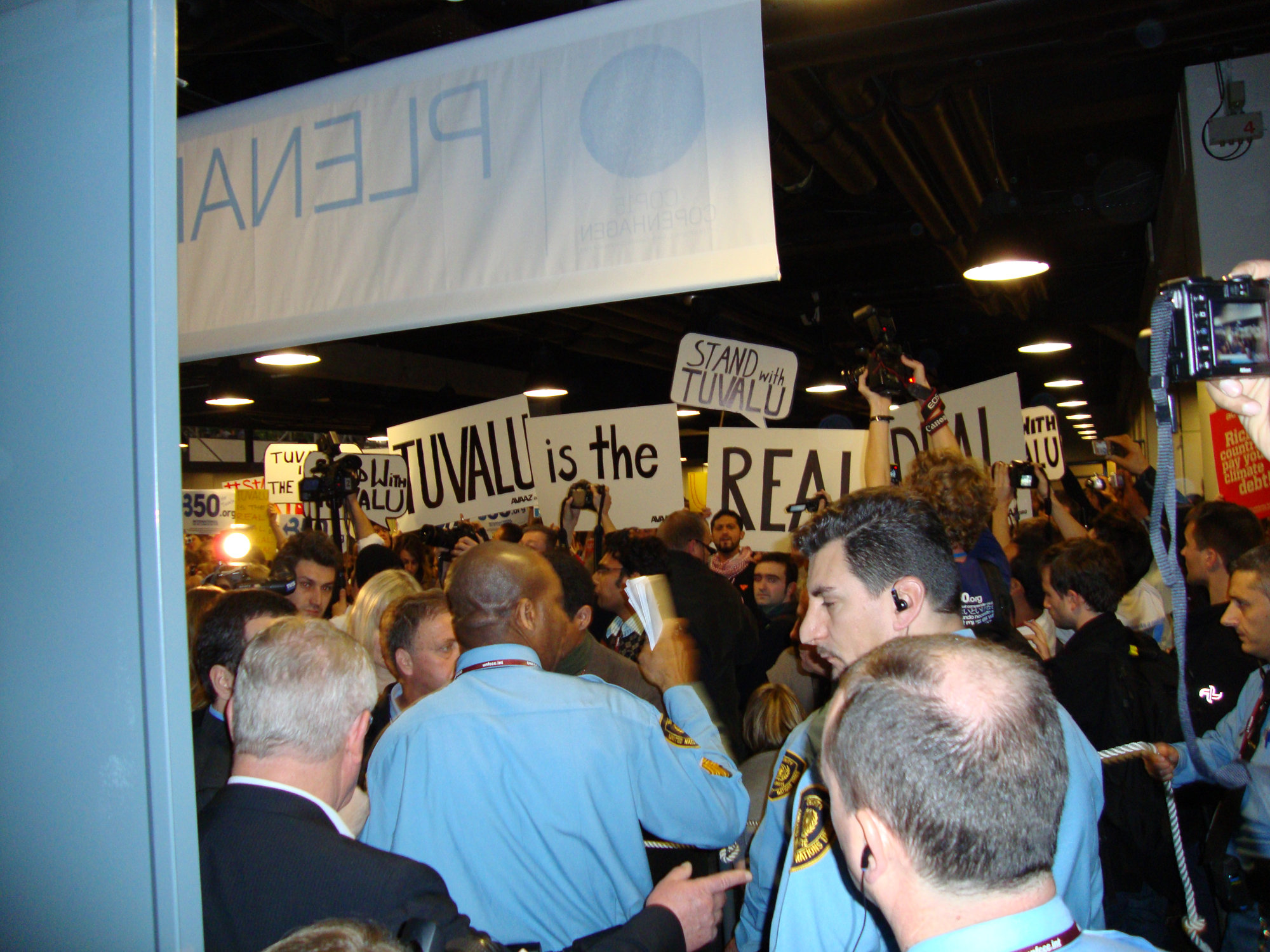by Taukiei Kitara and Carol Farbotko
Kitara is a Tuvaluan climate change activist and Carol Farbotko an Australian social scientist. They met in Tuvalu in 2005 and have collaborated on several writing projects to raise awareness about Tuvalu and climate change.
I am a Tuvaluan. I work in a gas factory and I am a climate change activist. I am not a climate refugee. I am a migrant in Australia. I want to share my story because it is a personal story about climate change.
In Tuvalu, fishing and growing food are very important. My family grew coconuts, taro, pulaka, pawpaw, breadfruit and bananas. I started to notice a lot of changes in the sea and land. Scientists seemed to be talking about the changes I was noticing in my islands. I knew that climate change was real. I learned that fossil fuels were causing the damage.
I was born on the island of Nui in Tuvalu, an island nation in the Pacific Ocean, as were my parents and their parents. Nui is my fenua, my island and my people. On my island, land is communal – owned by families, not individuals. Those members of my family who still live on Nui look after our land. They make sure that crops are planted, although this is becoming more difficult with saltwater inundation and erosion. But on Nui, life is beautiful. Most people don’t have jobs, but they don’t really need much cash. Fish and coconuts are still plentiful, and with some taro, pawpaw and banana growing, and pigs. There is usually enough to eat.

When I was a teenager I was lucky to get a scholarship to go to boarding school in Australia. That was when I discovered that I liked Australian life. I also realised I liked travelling and learning about different people and different places. I went back to Tuvalu when I finished school. I trained and worked as a high school English and Geography teacher. Then I started working in community development. I helped Tuvaluan communities to do projects to protect the environment and improve their livelihoods. We planted mangroves and implemented pig farming and crop-growing techniques that were better suited to the changing climate.
There were other changes too. Droughts were worse than they used to be. The weather was changing. Houses were being flooded during king tides. Fish were no longer in the shallower waters when I went out fishing to feed my family. We had to go further out, into deeper cooler waters, which was more dangerous. Our marine conservation areas were being used properly, but it was hard to look after fish stocks when the water temperature was rising.
I knew I had to try and do something about climate change. The scientists were warning that one day, all the islands in Tuvalu would be so badly affected by sea level rise that nobody would be able to live there. All of our nine islands in Tuvalu, including Nui, are very very small. You could walk all around the biggest one in a single day. Some of the islands are actually comprised of several tiny islets. These islets are very skinny. You can walk from one side to the other in less than five minutes. If the sea levels rise, there really is nowhere to go.
So I signed up to represent Tuvalu’s civil society at the international climate change negotiations. I wanted the voice of the communities I worked with to be heard. I travelled to China, Germany and Denmark to attend COPs where I met activists from all over the world. I learned about the international Climate Action Network and helped to set up TuCAN. I worked with Tuvaluan government representatives to try and get the international community to listen. We needed serious global reductions in fossil fuel use. At the Copenhagen COP in 2009 I was one of the few civil society representatives to still have access to the negotiations when everyone else was banned. Protests against the lack of agreement were too much of a ‘security risk’ according to the organisers. But since everyone in Tuvalu works together, I was able to join the Tuvalu government delegation. We all worked such long hours, and so hard, but Copenhagen was a failure. Nothing real was achieved. I went home devastated.

It was around this time that I fell in love with an Australian and we got engaged. I migrated to Brisbane six years ago when we got married. My wife and I both love Tuvalu, but it would have been hard for her to find work there. We wanted our children to be dual citizens and attend school in Australia.
When we first got married, my wife worked full time. I could not work because I had entered Australia on a tourist visa, waiting for my permanent residency visa application to be processed. When my PR finally came through, it was time for me bring my mum and daughter from a previous marriage to Australia. They had been waiting in Tuvalu for their PR too, because they were my dependents. I made the choice that we would all migrate, even though a part of me wants to be on my island, Nui. After a lot of worrying about how strange Australia would be for my mum and daughter, I decided that they would, on balance, be safer in Australia than in Tuvalu. Climate change is real, and it will become harder for children and the elderly to be safe.
One month after my mum and daughter arrived, my wife and I welcomed our first baby together. After getting pregnant, my wife had applied for and was accepted into a permanent job, after many years of casual and contract work. But she had not been in her new job long enough for entitlement to maternity leave. So our only income was about to dry up for several months, and there was my mum, daughter and new baby to look after. I had to find a job fast. My teaching diploma was not recognised in Australia, and community development work is hard to find, and I didn’t have a university qualification anyway, which didn’t help.

A Tuvaluan friend who had lived in Brisbane for a while had a job at a local gas depot. He told me they were looking for workers. I applied and got a casual position straight away. There were a few Tuvaluans there and we all were known for working hard. I have now worked at this job for five years. I was one of only nine out of 28 plant workers to be granted the opportunity to change from a casual to a permanent position. I also was one of a few to survive a merger with another gas company. In 2017, I was a finalist for the national employee of the year, the only plant worker in the history of the company to be nominated. I am working on risk assessments and am now a trainer. However, I have never been promoted and my wage is almost the minimum that any adult worker in Australia is legally allowed to earn. It is physically hard work and I am often exhausted and sometimes sick with the effort I put in, especially when we do overtime starting at 4 in the morning.
My wife and I welcomed another baby. Between work and kids and going to church, I do not have much time or energy left for climate activism these days. I don’t even have much time to look for a different job so that I don’t have to work in the fossil fuel industry. I would love to do work in the social or environmental sector, working for what I believe is good and right. Sometimes I send off job applications where I think I might have a chance, but so far, I have not been able to find work elsewhere. I still hope to do further study and work in a very different industry one day. But for now, our daily worry is the struggle to meet the costs of daycare and healthy food for a growing family – things I never had to worry about in Tuvalu. I have to keep going to work at the gas factory. I have hopes that maybe I can do some change for good within the system. For example, I support my co-workers who are not well educated or are migrants like me, who do not necessarily know all their rights as workers. I educate myself and others on our contracts and industrial agreements.
I will always be a proud Tuvaluan, no matter where I live. I am not a climate refugee. I chose to move, I was not forced out of my country by climate change. But I know that one day life might be almost unbearable on my island because of climate change. I also know that no Tuvaluan wants to be a climate refugee. Refugees do not seem to have their human rights respected, even though they are among those who most need the protection that human rights should be able to offer. No Tuvaluan wishes to be treated poorly. We would rather make our own choices. In fact, for many people in Tuvalu, there is a strong wish to stay on the islands no matter what climate change brings. Many would rather stay and die, than to migrate to another country or to be forced to go as a refugee.
I want my daughter and sons to grow up knowing their Tuvaluan identity, and sharing in the rich multicultural life of Australia. I hope that when my daughter is a young adult, in maybe ten years’ time, she will return to Tuvalu to spend time with family there. Then she can decide for herself if she would like to stay for a while, maybe to work among Tuvaluan communities or teach as I used to do. Sadly, my mum will never go back now, as she passed away and was buried in Australia.
My life in Australia has many blessings, but it is not easy. It is hard to meet the daily challenges. I struggle financially, I miss Tuvalu, I work hard, I am tired, I love my family. I am not powerless in the fight against climate change, but I have to pay the bills too and look after my kids in the home I have chosen for them. One day, maybe when the little ones are a bit older, I can be a climate change campaigner again.
Taukiei Kitara worked for over 10 years helping communities in Tuvalu, a Polynesian island nation located in the Pacific Ocean, to develop projects for sustainable livelihoods. He was a founding member of Tuvalu Climate Action Network and represented Tuvalu civil society at several meetings of the international climate change negotiations. In 2011 he migrated to Australia, where he now works as a trainer, assessor and cylinder tester and filler in a gas depot.
Carol Farbotko is a cultural geographer who has conducted research on the cultural politics of climate change, arguing for increased recognition of and dialogue about indigenous perspectives on climate change in the Pacific.
To receive our next article by mailing list, subscribe here.
